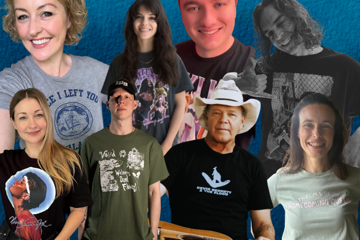Accolades & Why They Matter: Observations From BIGSOUND's Awards Judging Panel
Laugh all you want, but the ARIA Awards still stand as a worthy addition to any artist's CV.
The Australian music industry and its artists have a complex relationship with awards shows. Often the subject of (often unearned) derision, they nonetheless remain a key benchmark in any musician's career, and have an important role to play in legitimising the industry from both an internal and external perspective.
Moderated by (award-winning) journalist Kate Hennessy, today's panel featured insights from Dan Rosen (ARIA), Dave Faulkner (Australian Music Prize/Hoodoo Gurus) and Joel Edmondson (QMusic/BIGSOUND/Levi's Music Prize).
Why the ARIA Awards still matter
Decided by a judging pool of 700 (previously up to 850) artist, media and industry representatives, "the ARIA Awards is one of the rare times mainstream Australia engages with the music industry," Rosen said.
"When the Aria Awards is at its best is when it's helping artists grow their audience ... at its core, it's about celebrating our best artists across a range of genres and disciplines."
It also provides a rare opportunity for local artists to be seen on national television.
"The only options for musicians at the moment is the morning shows, sit on a panel on Q&A or The Project," Rosen said. "That's a high bar for an artist."
Don't miss a beat with our FREE daily newsletter
So, how does the AMP fit in?
"The AMP is almost like the in to the ARIAs," Faulkner mused.
"When we initially started it was about 40 judges ... until the third or fourth year; [then] it was 72 judges."
"After the 72-judge year, we realised there was a bit of a problem ... We were getting swamped towards mediocrity," he said.
"We felt outliers were the ones that were suffering ... and the ones we didn't dislike were the ones that would flourish.
"It's a bit of a strange thing judging apples against oranges against pineapples ... but we try to do it."
Levi's Music Prize — Best Of Both Worlds?
"The Levi's Music Prize is designed to be integrated into BIGSOUND," Edmondson explained. "It's kind of like a hybrid between a grant and a prize, really.
As the prize is "about making artists export ready", Edmondson said, "there's two things that are being judged ... who is the most likely to succeed in the territory, because it's an export prize, and who's generated buzz at BIGSOUND."
"It's great for BIGSOUND because it lifts the energy that little bit more [if artists are vying for financial incentive]."
Varied purposes = Varied judging procedures
"Basically, we try to get a diversity of backgrounds and geographical locations and obviously people that are passionate about music and have a broad taste," Faulkner said of the AMP's judge-selection process.
"I think a lot of it's about setting up the criteria, so on the artist side, if it's nominees for the last three years, that sort of picks itself; the Hall of Fame picks itself ... for the media side, we'll speak to each of the radio stations ... We speak to labels as well; so... it kind of ends up picking itself," Rosen explained about the ARIAs.
"For the grant part for the next three quarters, that's still being explored at the moment," Edmondson said. "Essentially we're just targeting who we believe to be the most influential visitors."
"There is a degree of subjectivity to it," he continued. "I don't want to use the word 'vibe' ... but it's really to do with how the band's presented on stage ... is this band ready to go and play a festival internationally?"
Criteria & Controversy
"[For the ARIAs] It's the act that nominates themselves — we don't choose what genre somebody's in," Rosen said.
"We had a bit of a controversy last year with classical," he said, referring to Flight Facilities' win in the category at 2016's event. "Some of the classical community were up in arms that it wasn't classical ... We have changed that this year that, during the year, you have to nominate for the ARIA classical chart to be eligible for that."
"It's not until a situation comes about that you might realise, 'Hang on, that doesn't work as it's intended' ... [for example], hard rock to rock is a very fine line." (The ARIAs also experienced mild controversy over King Gizzard & The Lizard Wizard winning the former category.)
"Not to hard rock people," Faulkner laughed.
"Part of the problem is that you're always dealing with a vocal minority giving feedback, and it's easy to fall into being reactive," Edmondson said. "Often the social media chatter isn't coming from anyone in the industry ... it's often uninformed."
"One of our biggest controversies in the AMP was about female representation [among judges]," Faulkner said. "There's great obstacles for women in music; it's easy to accept that as being true ... but we always have a good proportion of female artists on our longlist and shortlist."
"I don't think you can do anything more [as judges] than ensure there's a diversity of opinions making the decision," Edmondson agreed.
"Not to ignore the elephant in the room ... obviously there's been controversy about the Levi's menswear campaign, so there's conspiracy theories that a man's going to win it, all the judges are male," he said later. "The Levi's Music Prize is paid for by Levi's, but it's run by BIGSOUND and Sounds Australia.
"It does raise the issue of when major sponsors are involved in the music industry, and how that intersects."
"These companies have their own networks that can be really really helpful," Rosen added. "But a lot of them work with sports, and athletes are almost the direct opposite to artists ... artists kinda get to where they are by following their own path, so there is a lot of education with corporate sponsors with what will and will not fly."
What does it all mean?
"It can be a career changer," Rosen said. "It's obviously what you make of it when you get it ... I don't think anyone does it to win any awards, but when you do win it, it is a vote of confidence.
"Your parents finally get it!"
"I think storytelling about outcomes [is important]," Edmondson added. "Awards can do a lot better about following what happens [to artists] as a result of winning."
"I think the AMP has got respect just purely from its track record," Faulkner said. "Every year, our shortlist is quite diverse in itself ... that's something that we're very proud of.
"Any album that makes the shortlist is an album we think could win," he continued. "Overall, our whole policy is just to reward excellence ... it's not just an exercise in ego."







